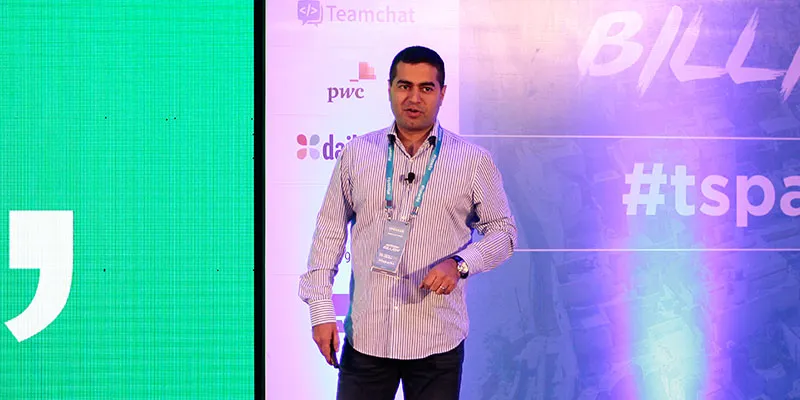Who are you? What do you stand for? Founders, establish your identity: Shailendra Singh, MD, Sequoia Capital
"'Sorry who are you again?' This possibly was one of the most common questions I had heard as a founder of a startup in the US. It was one of the most exhilarating and humbling experiences I have learnt in my life," says Shailendra Singh, MD of Sequoia Capital, at TechSparks 2015.
Establishing one's identity is probably the biggest challenge an entrepreneur faces. As the founder of a startup, the world doesn't know you. But it's solely your responsibility to establish your identity. Unfortunately, most hardcore engineering founders don't seem to realise this. Shailendra says that communication is key in keeping core messaging strong and powerful.

Many founders feel communicating is the job of the marketing department or some believe their product to be the next WhatsApp, in that it doesn't need any communication. "Good luck to you, but most mere mortals cannot build the next WhatsApp," says Shailendra, adding if founders focus on communication, chances are it will help them in the long run.
Core messaging
Shailendra explains that while core messaging is simple, most founders do not take the time and effort to get the following four key things right:
- Mission and vision statement: These are important and essential for a business. "It's important because, when in doubt, this is what you could refer to," Shailendra adds. In other words, it becomes a guiding principle of sorts.
- A few lines of elevator pitch for emailers: Shailendra says there are times when founders send him a description of what they do a couple of times and each time, it is different. "If you as a founder can't be consistent in your communication then others in your team cannot be either," he adds.
- Selling all the time: Shailendra says that an entrepreneur needs to be ready to sell all the time if he wishes to establish his identity. You're selling to investors to invest in you; to employees to be a part of your organisation; customers to do business with you. "You're selling all the time; if you don't like it, find a co-founder who does or learn how to sell, yourself," says Shailendra.
- Creating a PowerPoint: While many founders believe it to be a waste of time, Shailendra believes knowing how to create presentations is the basic hygiene factor. He adds that investing some time and effort in creating a good PowerPoint helps to bring structure to your thoughts and also helps the founder gain more clarity.
- Knowing the competition: "It is important to put yourself in the context of where you stand in the world," says Shailendra. A competitive map that frames the structure of your industry helps people make choices and helps the founder himself understand where his business needs to be in the value chain. Typically, when you innovate across the value chain, it's important to know who the others in the space are.
What should core messaging answer?
The key pointers that help you get a sharper core messaging, according to Shailendra, are:
- Following a trend: Hyperlocal and cloud are hot topics. If you're doing something in these spaces, it would be helpful to associate with these spaces. It helps set the context and understand the product. Shailendra's advice is to associate with important trends without becoming a cliche or a 'me-too' company.
- Be simple and articulate: The best example for this, Shailendra says, is Dropbox. 'Your files anywhere' is very simple, there no terminology here which doesn't say collaboration app.
- Right levels of abstraction: He adds that many times people communicate in a straightforward manner, without realising the need for a certain level of abstraction or ambiguity. "It eventually allows you to have a broader play," adds Shailendra. However, if you go too abstract, nobody understands you as well.
- Customer-centric messaging
- Make it memorable
- Repeat it over 10 times
- Differentiation: "A differentiation that is authentic and one that you can stand for makes a big difference," adds Shailendra.
- Clarity: He says that it is one of the most important aspects of communication.
- Own terminology: If you can articulate your strategy in creating your own terminology, it works wonders. "Your core insight can be understood in your own voice," says Shailendra.
Audience map
It's important for most founders to keep sending messages to keep communications alive with key stakeholders. The founder is in the centre and is surrounded by employees, board and advisors, consumers, the Press, investors, and even the rest of the world. "Many of these bleed into one another. The reason that some companies do consistently better is because they keep their communication alive with all these stakeholders. These, in turn, push the signals out," adds Shailendra. It's important to communicate differently to each stakeholder.
Making a clean deck
Shailendra says many companies don't realise the importance of keeping a deck. This is especially true in the case of established founders. "It's an opportunity and not a burden to help people understand who you are and what you're doing," he says. It is also important to make a clean presentation because it reflects directly on the entrepreneur and his company.
Clarity and authenticity
This leads to trust and an understanding of where you're headed as a group. If you're not clearly communicating your vision for the company and the way forward, how can your investors be passionate about it? This again is the founder's burden. Accuracy is equally important. "If you say things that are untrue or exaggerated it causes trust issues for the founder and the organisation," says Shailendra. In the desire to appear big and hot don't exaggerate your numbers or investments.
Small press meetups
Most companies go to the Press only when they have a big announcement to make. But you need to meet journalists and invest time in explaining what your company is doing.
Make yourself known in your voice
This is important because whenever you meet people, they speak about your organisation in their voice and give their version. It's important to stand for yourself in your own words via blogs, Twitter, and other social media platforms.
Consumers care about different things
"Customers don't care about your valuation, culture, or funding; they just care about the value and what you stand for," says Shailendra. So when you say something to a consumer, it needs to be consistent, have value and must display your commitment to it. This consistency needs to be from every member of the team and should be harmonious and memorable.
Employees need different levels of motivation
Shailendra shares that employees care about the impact created, opportunities they have, and growth. They need to understand your culture clearly. "Exaggerated figures here send a negative message to the employees who lose trust in the organisation," adds Shailendra. Appreciate your employees in small ways in meetings and in emails. Acknowledging your employees helps in boosting their levels of motivation. "Keep your employees updated on where you are headed in an organisation," says Shailendra.
With the senior management team, it's important to create a rhythm and have clear lines of communication. They need to be aligned to the same goal.
The key is to keep communication consistent, clear, authentic, and open.
A big shoutout to TechSparks 2015 sponsors – Sequoia Capital, ICICI Bank, Money on Mobile, Microsoft, Signal Hill, IBM Bluemix, PwC, Atom Tech, Teamchat, Govt. of Karnataka, Intel, Rabbler, Dailyhunt, Reverie, Loginext and PayUBiz; Partners – Duff&Phelps, Taxmantra, Dineout, Exotel, 360ride, Yoga Bar, Chai Point, GWC; and our Media Partners – TV9, Fortune India, RedFM and Deccan Herald.







